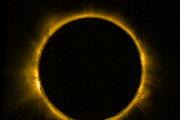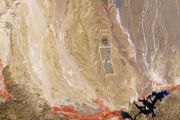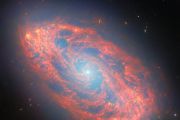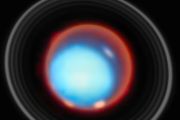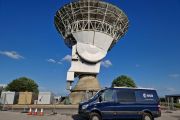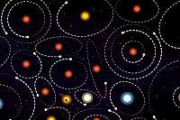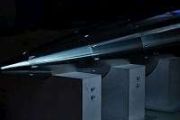
Copernical Team
Russia launches resupply ship to int'l space station
 Russia successfully launched a Soyuz rocket from Kazakhstan on Thursday with a final destination of the International Space Station where it will deliver some 3 tons of supplies on the weekend.
The three-stage Soyuz-2 rocket launched as scheduled at 1:15 a.m. EST from the Baikonur Cosmodrome.
It was late morning in Baikonur when liftoff occurred, and the rocket soared through sun
Russia successfully launched a Soyuz rocket from Kazakhstan on Thursday with a final destination of the International Space Station where it will deliver some 3 tons of supplies on the weekend.
The three-stage Soyuz-2 rocket launched as scheduled at 1:15 a.m. EST from the Baikonur Cosmodrome.
It was late morning in Baikonur when liftoff occurred, and the rocket soared through sun SpaceX to test-fire all 33 Starship booster engines Thursday
 SpaceX will embark on a monumental step toward launching Starship on Thursday when it test-fires all 33 of its first-stage boosters.
President Gwynne Shotwell shared a modest goal for the day, stating that not blowing up the launch pad would be considered a success. She was a keynote speaker at the Federal Aviation Administration's Annual Commercial Space Transportation Conference in Wa
SpaceX will embark on a monumental step toward launching Starship on Thursday when it test-fires all 33 of its first-stage boosters.
President Gwynne Shotwell shared a modest goal for the day, stating that not blowing up the launch pad would be considered a success. She was a keynote speaker at the Federal Aviation Administration's Annual Commercial Space Transportation Conference in Wa Space Daily retools to AI/ML centric Content Management System
 SpaceDaily.com, a pioneer in the field of technology and science news for over 25 years, has announced the launch of a new AI/ML-centric Content Management System (CMS) that will take its newsroom operations to the next level. Building upon decades of automation process development, this innovative platform represents the future of SpaceDaily.com, leveraging the latest Large Language Model (LLM) software technology to enhance its news editorial and production capabilities.
SpaceDaily.com, a pioneer in the field of technology and science news for over 25 years, has announced the launch of a new AI/ML-centric Content Management System (CMS) that will take its newsroom operations to the next level. Building upon decades of automation process development, this innovative platform represents the future of SpaceDaily.com, leveraging the latest Large Language Model (LLM) software technology to enhance its news editorial and production capabilities. ESA’s Cheops finds an unexpected ring around dwarf planet Quaoar
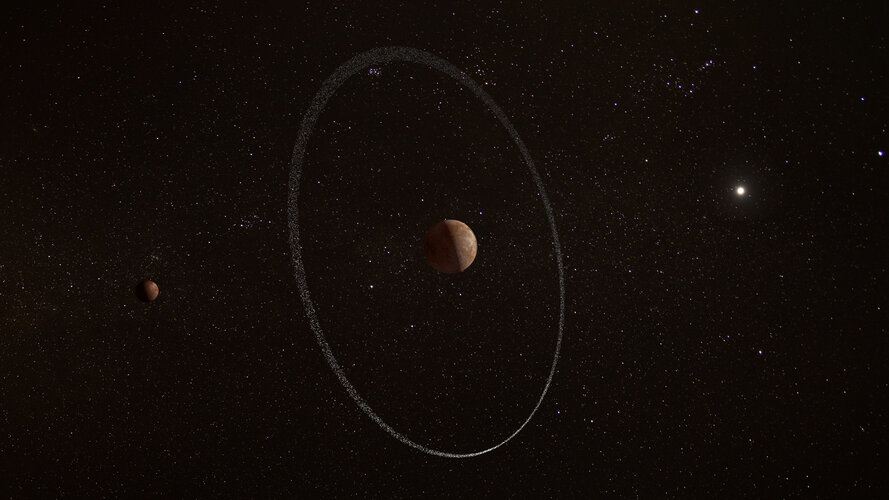
During a break from looking at planets around other stars, ESA’s CHaracterising ExOPlanet Satellite (Cheops) mission has observed a dwarf planet in our own Solar System and made a decisive contribution to the discovery of a dense ring of material around it.
The dwarf planet is known as Quaoar. The presence of a ring at a distance of almost seven and a half times the radius of Quaoar, opens up a mystery for astronomers to solve: why has this material not coalesced into a small moon?
In search of the invisible galaxy
 A mysterious and very distant object, in a universe as it was 'just' two billion years after the Big Bang, that hides from even the most advanced instruments. Its features have finally been described by a team from SISSA in a recently published study reported in The Astrophysical Journal.
An extremely remote celestial body in a still young Universe, one sixth the size of the present one. A
A mysterious and very distant object, in a universe as it was 'just' two billion years after the Big Bang, that hides from even the most advanced instruments. Its features have finally been described by a team from SISSA in a recently published study reported in The Astrophysical Journal.
An extremely remote celestial body in a still young Universe, one sixth the size of the present one. A Distortion-free structured light
 An exciting prospect in modern optics is to exploit patterns of light - how the light looks in its many degrees of freedom - often referred to as "structured light." Each distinct pattern could form an encoding alphabet for optical communication, or might be used in manufacturing to enhance performance and productivity. Unfortunately, patterns of light get distorted when they pass through noisy
An exciting prospect in modern optics is to exploit patterns of light - how the light looks in its many degrees of freedom - often referred to as "structured light." Each distinct pattern could form an encoding alphabet for optical communication, or might be used in manufacturing to enhance performance and productivity. Unfortunately, patterns of light get distorted when they pass through noisy How to reverse unknown quantum processes
 In the world around us processes appear to follow a certain time-direction: dandelions eventually turn into blowballs. However, the quantum realm does not play by the same rules. Physicists from the University of Vienna and IQOQI Vienna have now shown that for certain quantum systems the time-direction of processes can be reversed. This demonstration of a so-called rewinding protocol has been pu
In the world around us processes appear to follow a certain time-direction: dandelions eventually turn into blowballs. However, the quantum realm does not play by the same rules. Physicists from the University of Vienna and IQOQI Vienna have now shown that for certain quantum systems the time-direction of processes can be reversed. This demonstration of a so-called rewinding protocol has been pu Asteroid impact in slow motion
 Asteroid impacts are catastrophic events that create huge craters and sometimes melt parts of Earth's bedrock." Nevertheless, craters are often difficult to detect on Earth, because erosion, weathering and plate tectonics cause them to disappear over millions of years," Langenhorst explains. Therefore, minerals that undergo characteristic changes due to the force of the impact often serve as evi
Asteroid impacts are catastrophic events that create huge craters and sometimes melt parts of Earth's bedrock." Nevertheless, craters are often difficult to detect on Earth, because erosion, weathering and plate tectonics cause them to disappear over millions of years," Langenhorst explains. Therefore, minerals that undergo characteristic changes due to the force of the impact often serve as evi Searching for a Drill Site Near Encanto: Sols 3735-3736
 Curiosity successfully followed her tracks and is back near the Encanto drill site! With a beautiful workspace in view, the science and operations team had a busy day of planning on the "Marker band" surface. We assessed potential drill targets, selected targets for contact science, and planned imaging.
When evaluating the rocks in the area for the best possible drill site, the team focuse
Curiosity successfully followed her tracks and is back near the Encanto drill site! With a beautiful workspace in view, the science and operations team had a busy day of planning on the "Marker band" surface. We assessed potential drill targets, selected targets for contact science, and planned imaging.
When evaluating the rocks in the area for the best possible drill site, the team focuse Enchanting Encanto Calls: Sols 3732-3734
 Today we made a three-sol plan for the weekend including contact science, lot of imaging, and a long drive back toward the previously attempted marker band drill target, Encanto. After additional exploration of the marker band, the team decided it was worth turning around and trying to drill again in the same general location as Encanto.
I took on a new role as Engineering Uplink Lead (EUL
Today we made a three-sol plan for the weekend including contact science, lot of imaging, and a long drive back toward the previously attempted marker band drill target, Encanto. After additional exploration of the marker band, the team decided it was worth turning around and trying to drill again in the same general location as Encanto.
I took on a new role as Engineering Uplink Lead (EUL 






